437. The path from the left foot of Orion
(Rigel) - immersed in the Eridanus River - up to Tau-toru
and further on to the armpit of Orion (Betelgeuze) - did not end there:
... By repeating a
charm, she opened the two shells and slipped inside. She
could see nothing, because the sun and the moon did not
then exist; and then, she could not stand up because
there was not enough room in the shellfish. Constantly
hunting about she at last found a snail. To endow it
with power she placed it under her arm, lay down and
slept for three days. Then she let it free, and still
hunting about she found another snail bigger than the
first one, and treated it in the same way. Then she said
to the first snail: 'Can you open this room a little, so
that we can sit down?' The snail said it could, and
opened the shell a little.
  . .
Old-Spider then took
the snail, placed it in the west of the shell, and made
it into the moon. Then there was a little light, which
allowed Old-Spider to see a big worm. At her request he
opened the shell a little wider, and from the body of
the worm flowed a salted sweat which collected in the
lower half-shell and became the sea. Then he raised the
upper half-shell very high, and it became the sky.
Rigi, the worm, exhausted by this great effort, then
died. Old-Spider then made the sun from the second
snail, and placed it beside the lower half-shell, which
became the earth ...
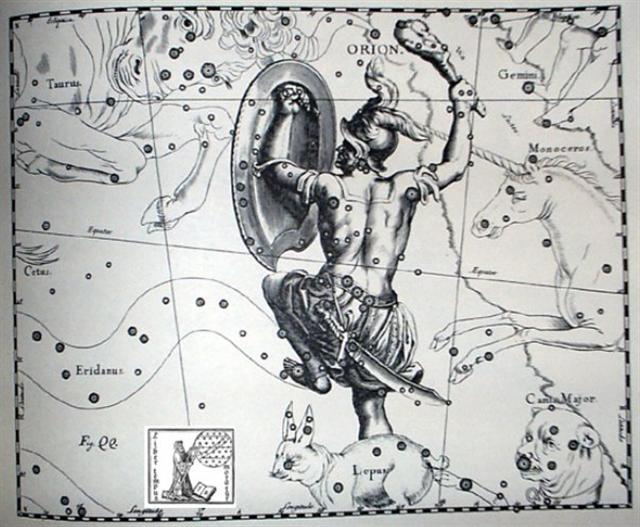
Instead it continued across the River at the
right ascension line for 6h and up onto dry ground (terra
firma) on the other side, to the left foot of the
hairy Beaver (Castor) still down in the Milky Way River:
.jpg)
 |
 |
 |
|
Ca4-1 |
(*78) RIGEL (Foot) |
Ca4-3 (79) |
|
kua tupu te rakau |
kua tupu - te kihikihi |
te hau tea |
 |
 |
 |
 |
 |
 |
|
Ca4-4 |
Ca4-5 |
Ca4-6 |
Tau-toru
(83) |
Ca4-8 |
Ca4-9 |
|
tagata - te rau hei |
te hokohuki i te moko |
te rau hei |
e gagata hakaariki |
manu |
te rau hei |
 |
 |
 |
 |
364 |
|
Ca4-10 |
Ca4-11 |
(*88) BET-EL-GEUZE |
Ca4-13 → 14 * 29½ |
|
te hokohuki |
te moko |
te hokohuki |
kua tuu tona mea |
 |
 |
 |
|
Cb3-13 (454 = 88 + 366) |
Cb3-14
→ π |
Cb3-15 (8 * 8) |
|
manu rere |
tagata - hanau hia |
kiore - henua |
|
Kiore.
Rat. Vanaga. Rat,
mouse; kiore hiva, rabbit. P Pau.,
Mgv.: kiore, rat, mouse. Mq.: kioē,
íoé,
id. Ta.: iore,
id. Churchill.
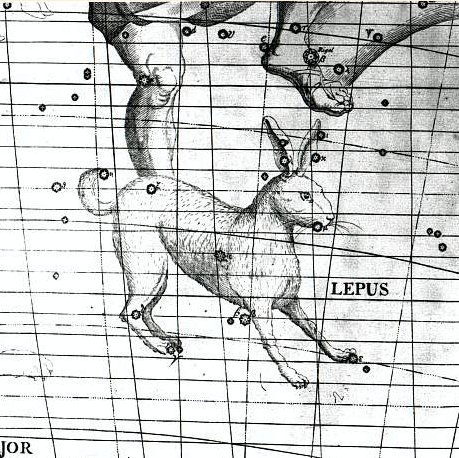 |
|
APRIL 14 (104 = 78 + 26 = 88 + 16) |
15 (*25 = *89 - *64 = *41 - *16) |
16 |
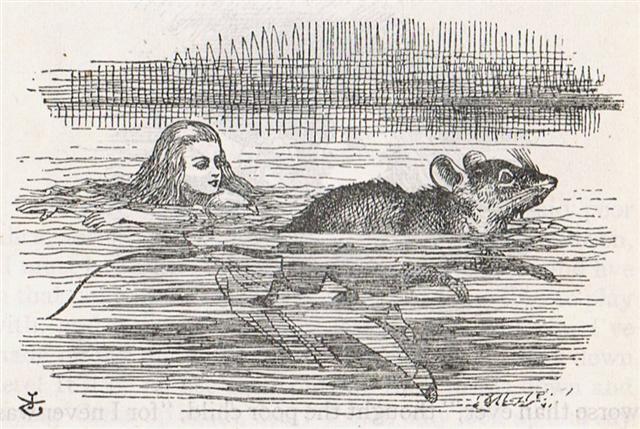
... In China, with Capricornus, Pisces, and
a part of Sagittarius, it [Aquarius]
constituted the early Serpent, or Turtle,
Tien Yuen; and later was known as
Hiuen Ying, the Dark Warrior and Hero,
or Darkly Flourishing One, the Hiuen Wu,
or Hiuen Heaou, of the Han dynasty,
which Dupuis gave as Hiven Mao. It
was a symbol of the emperor Tchoun Hin,
in whose reign was a great deluge; but after
the Jesuits came in it became Paou Ping,
the Precious Vase. It contained three of the
sieu, and headed the list of zodiac signs as
the Rat, which in the far East was
the ideograph for 'water', and still so
remains in the almanacs of Central Asia,
Cochin China, and Japan ... |
 |
 |
 |
 |
|
Cb3-16 (457 = 91 + 366) |
Cb3-17 |
Cb3-18 |
Cb3-19 (68 = 460 - 392) |
|
henua kua hoi |
kua ka te ahi o te henua |
o te henua kua hoi |
ko te henua kua vero te
ahi |
|
Ahi.
Fire; he-tutu i
te ahi to light a fire. Ahiahi =
evening; ahiahi-ata, the last moments
of light before nightfall. Vanaga. 1.
Candle, stove, fire (vahi); ahi
hakapura, match; ahi hakagaiei,
firebrand waved as a night signal. P Mgv.:
ahi, fire, flame. Mq.: ahi,
fire, match, percussion cap. Ta.: ahi,
fire, percussion cap, wick, stove. 2. To be
night; agatahi ahi atu, day before
yesterday. 3. Pau.: ahi, sandalwood.
Ta.: ahi, id. Mq.: auahi, a
variety of breadfruit. Sa.: asi,
sandalwood. Ha.: ili-ahi, id.
Ahiahi, afternoon, night; kai ahiahi,
supper. P Pau., Mgv., Mq., Ta.: ahiahi,
afternoon, evening. Ahipipi (ahi
1 - pipi 2) a spark, to flash.
Churchill.
Hoki.
To return,
to
go back, to come back; ka hoki ki rá, go back there! ana
oho koe ki Hiva, e hoki mai ki nei, if
you go to the mainland, do come back here
again. Vanaga. 1. Also, what; ki ra hoki,
precisely there; pei ra hoki,
similitude, likeness; pei ra hoki ta
matou, usage. P Pau.: hokihoki,
often. Mgv.: hoki, also, and,
likewise. Mq.: hoi, surely. Ta.:
hoi, also, likewise. 2. To return, to
turn back, to draw back, to give back, to
tack; mau e hoki mai, to lend;
hoki hakahou, to carry back; hoki
amuri, to retrograde; hakahoki,
to bring back, to send back, to carry back,
to restore, to renew, to revoke, to remove,
to dismiss, to pay, to pardon, to compress;
hakahokia, given up; hakahokihaga,
obligation. P Pau.: hokihoki, to
persist, to insist; fakahoki, to give
back. Mgv.: hoki, to return, to
retrace one's steps; oki, to return,
to come back. Ta.: hoi, to return, to
come back. Ta.: mahoi, the essence or
soul of a god. Churchill. |
|
CLOSE TO
THE FULL MOON: |
|
6h (91.3)
ν
Orionis (91.4),
θ
Columbae (91.5),
π
Columbae (91.6)
*50 = *91.4 - *41.4 |
ξ Orionis (92.5) |
Al Han'ah-4 (Brand) /
Maru-sha-pu-u-mash-mashu-7 (Front of the
Mouth of the Twins)
TEJAT PRIOR =
η
Gemini
(93.4),
γ
Monocerotis (93.5),
κ
Aurigae (93.6),
κ
Columbae (93.8)
*52 = *93.4 - *41.4 |
FURUD
= ζ Canis Majoris
(94.9) |
|
June 20 (171 = 80 + 91) |
SOLSTICE |
22 |
23 |
|
'May 24 (144 = 171 - 27) |
25 |
26 |
27 |
|
"May 10 (130 = 171 - 41) |
11 |
12 (*52) |
13 |
|
APRIL 17 (107 = 171 - 64) |
18 |
19 |
20 |
|
FEBR 19 (50 = 171 - 121) |
20 |
21 (52) |
22 |
 |
At the time of rongorongo 6h came 64
right ascension days earlier among the stars than at the time of the
Bull and therefore June 20 (171) was 64 days
earlier than my right ascension date APRIL 17 (107 = 171 - 64
= 471 - 364 = 314 * 1½ - 13 * 28).
Down to the time of Spica, the
leading star in Virgo,
the precessional distance was 121 (= 11 * 11) right
ascension days - as a Sign of Reproduction because
eleven (11, OE. endleofon = 'one left over
beyond 10') meant 'one more'. Thus FEBR 19 (50) = 171
(June 20) - 121 = 7 * 7 + 1.
Down to the time of Bharani (Yoni, another
place for Reproduction),

the precessional distance
was 80 days shorter than to that of Spica, which meant June 20 (171)
corresponded to "May 10 (*50) - i.e. a Sign that
the corresponding day at the time of Spica had been
number 50. "May 10 (130) - 80 = 50 (FEBR 19).
There were 8 days following
Betelgeuze which seem to have defined the
position of Rakau (the Tree):
 |
 |
 |
 |
|
Ca4-13 → 14 * 29½ |
Ca4-14 (90) |
(*91.3 = 64)
Ca4-15 |
Ca4-16 (92) |
|
kua tuu tona mea |
te henua |
te hau tea |
mauga hua - te henua |
|
Mea.
1. Tonsil, gill
(of fish). 2. Red (probably because it is
the colour of gills); light red, rose; also
meamea. 3. To grow or to exist in
abundance in a place or around a place:
ku-mea-á te maîka, bananas grow in
abundance (in this place); ku-mea-á te
ka, there is plenty of fish (in a
stretch of the coast or the sea);
ku-mea-á te tai, the tide is low and the
sea completely calm (good for fishing);
mau mea, abundance. Vanaga. 1. Red;
ata mea,
the dawn.
Meamea, red, ruddy, rubricund,
scarlet, vermilion, yellow;
ariga meamea,
florid; kahu
meamea purple;
moni meamea,
gold;
hanuanua meamea, rainbow;
pua ei meamea,
to make yellow.
Hakameamea,
to redden, to make yellow. PS Ta.:
mea,
red. Sa.:
memea, yellowish brown, sere.
To.: memea,
drab. Fu.:
mea, blond, yellowish, red,
chestnut. 2. A thing, an object, elements (mee);
e mea,
circumstance;
mea ke,
differently, excepted, save, but;
ra mea,
to belong;
mea rakerake, assault;
ko mea,
such a one;
a mea nei, this;
a mea ka,
during; a
mea, then;
no te mea,
because, since, seeing that;
na te mea,
since; a mea
era, that;
ko mea tera,
however, but.
Hakamea,
to prepare, to make ready. P Pau., Mgv.,
Mq., Ta.:
mea, a thing. 3. In order that,
for. Mgv.:
mea, because, on account of,
seeing that, since. Mq.:
mea,
for. 4. An individual;
tagata mea,
tagata mee,
an individual. Mgv.:
mea,
an individual, such a one. Mq., Ta.:
mea,
such a one. 5. Necessary, urgent;
e mea ka,
must needs be, necessary;
e mea,
urgent. 6. Manners, customs. 7. Mgv.:
ako-mea,
a red fish. 8. Ta.:
mea,
to do. Mq.:
mea, id. Sa.:
mea,
id. Mao.:
mea, id. Churchill.
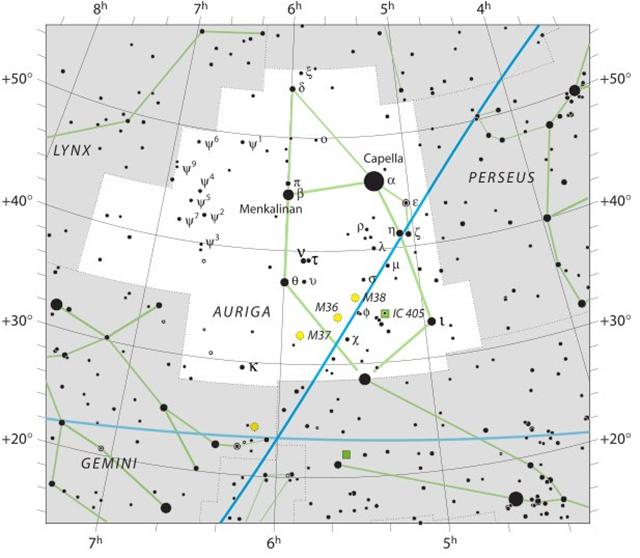 |
 |
 |
 |
 |
|
(*93) TEJAT PRIOR |
Ca4-18 |
(*95) CANOPUS |
Ca4-20 (96) |
|
te hau tea |
tupu te rakau - te
henua |
te hau tea |
tupu te rakau |
|
Rakau.
Raau, medicine, remedy, drug.
Ra'a'u, scratch on the skin.
Rakau, a plant. Râkau, goods,
property. Vanaga. 1. Wood; rakau ta,
cudgel, stick. P Pau.: rakau,
tree, to dress a wound. Mgv.: rakau,
wood, timber, a tree; medicine, a
remedy; an object. Mq.: ákau,
wood, tree. Ta.: raáu, id. 2.
Medicine, remedy, potion, ointment,
furniture, any precious object,
resources, baggage, riches, heritage,
dowry, merchandise, treasure, wealth;
rakau hakaneinei, purgative;
rakau nui, rich, opulent; rakau
kore, poor, beggar, indigent,
miserable, an inferior; hakakamikami
ki te rakau, to impoverish; rakau
o te miro, ballast. Mq.: akau,
anything in general. The medicine sense
is particularized in Tonga, Nukuoro,
Hawaii, Tahiti, Mangareva, Paumotu. In
no other speech does wood stand so fully
for wealth of possessions, but it will
be recalled that Rapanui is
destitute of timber and depends wholly
upon driftwood. Churchill. |
|
June 22 |
23 |
ST JOHN'S DAY |
25 |
|
'May 26 |
27 |
28 |
29 |
|
"May
12 |
13 |
14 |
15 |
|
APRIL
19 |
20 |
21 |
22 |
|
FEBR 21 |
22 (53) |
TERMINALIA |
BISSEXTUM |
The root ('foot') of the Tree was
evidently down at Canopus (the leading star of
Argo Navis):

...
The Pythagoreans make Phaeton fall into
Eridanus, burning part of its water, and glowing
still at the time when the Argonauts passed by.
Ovid stated that since the fall the Nile hides
its sources. Rigveda 9.73.3 says that the Great
Varuna has hidden the ocean. The Mahabharata
tells in its own style why the 'heavenly Ganga'
had to be brought down. At the end of the Golden
Age (Krita Yuga) a class of Asura
who had fought against the 'gods' hid themselves
in the ocean where the gods could not reach
them, and planned to overthrow the government.
So the gods implored Agastya (Canopus,
alpha Carinae = Eridu) for help. The great Rishi
did as he was bidden, drank up the water of the
ocean, and thus laid bare the enemies, who were
then slain by the gods. But now, there was no
ocean anymore! Implored by the gods to fill the
sea again, the Holy One replied: 'That water in
sooth hath been digested by me. Some other
expedient, therefore, must be thought of by you,
if ye desire to make endeavour to fill the ocean
...
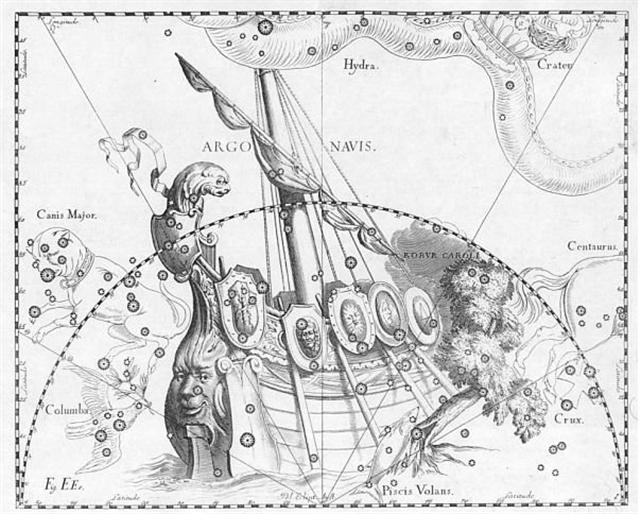
|



.jpg)




















